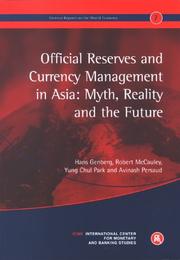| Listing 1 - 10 of 494 | << page >> |
Sort by
|
Book
Year: 2005 Publisher: Washington. D.C. : International Monetary Fund,
Abstract | Keywords | Export | Availability | Bookmark
 Loading...
Loading...Choose an application
- Reference Manager
- EndNote
- RefWorks (Direct export to RefWorks)
Reviews progress under the Fund's strengthened cooperative strategy on overdue financial obligations and proposes to extend the availability of the rights approach, which expires on August 31, 2005, by another year. The rights approach remains a potentially important element of the intensified collaborative approach for arrears clearance for the three members that remain eligible, Liberia, Somalia, and Sudan.
Book
ISBN: 1498371639 Year: 2005 Publisher: Washington. D.C. : International Monetary Fund,
Abstract | Keywords | Export | Availability | Bookmark
 Loading...
Loading...Choose an application
- Reference Manager
- EndNote
- RefWorks (Direct export to RefWorks)
Reviews progress under the Fund's strengthened cooperative strategy on overdue financial obligations and proposes to extend the availability of the rights approach, which expires on August 31, 2005, by another year. The rights approach remains a potentially important element of the intensified collaborative approach for arrears clearance for the three members that remain eligible, Liberia, Somalia, and Sudan.


ISBN: 1898128901 Year: 2005 Publisher: Geneva International center for monetary and banking studies
Abstract | Keywords | Export | Availability | Bookmark
 Loading...
Loading...Choose an application
- Reference Manager
- EndNote
- RefWorks (Direct export to RefWorks)
Book
ISBN: 2100494422 Year: 2005 Publisher: Paris : Dunod,
Abstract | Keywords | Export | Availability | Bookmark
 Loading...
Loading...Choose an application
- Reference Manager
- EndNote
- RefWorks (Direct export to RefWorks)
Bank management --- Bank marketing --- Banques --- Banques --- Direction --- Marketing

ISBN: 9290795913 9789290795919 Year: 2005 Publisher: Brussels: Centre for European policy studies,
Abstract | Keywords | Export | Availability | Bookmark
 Loading...
Loading...Choose an application
- Reference Manager
- EndNote
- RefWorks (Direct export to RefWorks)
Small business --- Credit --- Bank capital
Book
Year: 2005 Publisher: Washington, D.C. World Bank
Abstract | Keywords | Export | Availability | Bookmark
 Loading...
Loading...Choose an application
- Reference Manager
- EndNote
- RefWorks (Direct export to RefWorks)
Periodical
Year: 2005 Publisher: Luxembourg
Abstract | Keywords | Export | Availability | Bookmark
 Loading...
Loading...Choose an application
- Reference Manager
- EndNote
- RefWorks (Direct export to RefWorks)
Book
Year: 2005 Publisher: [Washington, D.C. : World Bank,
Abstract | Keywords | Export | Availability | Bookmark
 Loading...
Loading...Choose an application
- Reference Manager
- EndNote
- RefWorks (Direct export to RefWorks)
"The authors study the effect of financial crises on trade credit in a sample of 890 firms in six emerging economies. They find that although provision of trade credit increases right after the crisis, it consequently collapses in the following months and years. The authors observe that firms with weaker financial position (for example, high pre-crisis level of short-term debt and low cash stocks and cash flows) are more likely to reduce trade credit provided to their customers. This suggests that the decline in aggregate credit provision is driven by the reduction in the supply of trade credit, which follows the bank credit crunch. The results are consistent with the "redistribution view" of trade credit provision, in which bank credit is redistributed by way of trade credit by the firms with stronger financial position to the firms with weaker financial stand "--World Bank web site.
Bank loans. --- Credit. --- Financial crises.
Book

Year: 2005 Publisher: Brussel Nationale Bank van België
Abstract | Keywords | Export | Availability | Bookmark
 Loading...
Loading...Choose an application
- Reference Manager
- EndNote
- RefWorks (Direct export to RefWorks)
Book
Year: 2005 Publisher: [Washington, D.C. : World Bank,
Abstract | Keywords | Export | Availability | Bookmark
 Loading...
Loading...Choose an application
- Reference Manager
- EndNote
- RefWorks (Direct export to RefWorks)
"The authors study the effect of financial crises on trade credit in a sample of 890 firms in six emerging economies. They find that although provision of trade credit increases right after the crisis, it consequently collapses in the following months and years. The authors observe that firms with weaker financial position (for example, high pre-crisis level of short-term debt and low cash stocks and cash flows) are more likely to reduce trade credit provided to their customers. This suggests that the decline in aggregate credit provision is driven by the reduction in the supply of trade credit, which follows the bank credit crunch. The results are consistent with the "redistribution view" of trade credit provision, in which bank credit is redistributed by way of trade credit by the firms with stronger financial position to the firms with weaker financial stand "--World Bank web site.
Bank loans. --- Credit. --- Financial crises.
| Listing 1 - 10 of 494 | << page >> |
Sort by
|

 Search
Search Feedback
Feedback About UniCat
About UniCat  Help
Help News
News